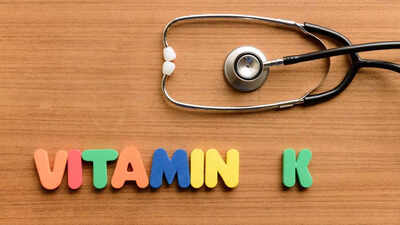 Although often overlooked compared with nutrients like Vitamin D or calcium, vitamin K plays a vital role in several essential bodily functions. Beyond its well-known contribution to blood clotting, it also supports bone strength, cardiovascular health, and cellular balance. When the body lacks sufficient vitamin K, the effects can quietly build up until symptoms become apparent, sometimes with serious consequences. In recent years, researchers and clinicians have recognised that vitamin K deficiency is more widespread than once believed, particularly among individuals with gut disorders, restrictive diets, or long-term medication use. Understanding how this deficiency presents and how to address it is key to maintaining long-term health.
Although often overlooked compared with nutrients like Vitamin D or calcium, vitamin K plays a vital role in several essential bodily functions. Beyond its well-known contribution to blood clotting, it also supports bone strength, cardiovascular health, and cellular balance. When the body lacks sufficient vitamin K, the effects can quietly build up until symptoms become apparent, sometimes with serious consequences. In recent years, researchers and clinicians have recognised that vitamin K deficiency is more widespread than once believed, particularly among individuals with gut disorders, restrictive diets, or long-term medication use. Understanding how this deficiency presents and how to address it is key to maintaining long-term health.
How Vitamin K keeps the body in balance
Vitamin K occurs naturally in two forms: phylloquinone (vitamin K1), found mainly in leafy greens, and menaquinones (vitamin K2), produced by gut bacteria and present in fermented foods and certain animal products. These compounds help activate proteins that regulate blood coagulation, calcium distribution, and tissue integrity. Without adequate vitamin K, these proteins remain inactive, disrupting the body’s ability to manage bleeding and maintain healthy bones.
Feeling tired, sad, or weak? Find out which vitamin you’re missing
The liver is central to this process. It uses vitamin K to convert clotting precursors into active forms that can stop bleeding when blood vessels are injured. At the same time, Vitamin K-dependent proteins such as osteocalcin and matrix Gla protein ensure calcium is directed into bones instead of accumulating in arteries. This balance is what links vitamin K to both skeletal and cardiovascular health, showing how its deficiency can have broad, long-term consequences.
What are the early warning signs of Vitamin K deficiency
According to a study featured in StatPearls, certain symptoms of vitamin K deficiency may be more serious than they seem. Vitamin K deficiency often progresses quietly, making early recognition important. Some of the most common signs include:Prolonged bleeding: Even minor cuts or injuries may take longer to stop bleeding due to insufficient clotting factors.Easy bruising: Unexplained bruises, especially in areas not prone to injury, occur because blood vessels become fragile without adequate clotting protection.Frequent nosebleeds and bleeding gums: These may seem harmless but can be among the first indicators of deficiency.Blood in stool or urine: Internal bleeding within the digestive or urinary system may appear as dark, tar-like stools or red urine.Heavy menstrual cycles: Women may experience excessive bleeding during menstruation, a symptom sometimes mistaken for hormonal imbalance.Bleeding in newborns: Infants are particularly vulnerable since they are born with limited vitamin K reserves, and deficiency can lead to a rare but serious condition known as vitamin K deficiency bleeding (VKDB).Laboratory tests often reveal prolonged clotting times before visible symptoms develop. If untreated, severe deficiency may result in internal haemorrhage or contribute to reduced bone density over time.
Who is most at risk and why it matters
Certain groups are more likely to develop vitamin K deficiency because of absorption issues or medical conditions. People with gastrointestinal disorders such as Crohn’s disease, coeliac disease, or ulcerative colitis often struggle to absorb fat-soluble vitamins effectively. Prolonged antibiotic use can also deplete beneficial gut bacteria that synthesise vitamin K2.Older adults, individuals with liver disease, and those on long-term anticoagulant medications such as warfarin are at higher risk too. The liver not only stores vitamin K but also activates the enzymes that depend on it. When liver function is impaired, even normal dietary intake may not meet physiological demands. These overlapping factors make it important for clinicians to monitor vitamin K levels, especially in high-risk populations.
How the body reveals the deeper impact of deficiency
Beyond its role in coagulation, vitamin K has far-reaching effects on bones and the cardiovascular system. Deficiency can impair the activation of osteocalcin, a key protein responsible for binding calcium to the bone matrix, leading to weaker bones and an increased risk of osteoporosis. Simultaneously, low vitamin K levels reduce the activity of matrix Gla protein, allowing calcium to accumulate in arteries and contributing to vascular stiffness and higher cardiovascular risk.Emerging studies also suggest that vitamin K may play a role in brain health. The vitamin contributes to the synthesis of sphingolipids, which are vital for maintaining neuronal structure and communication. Although the connection between vitamin K and neurological function remains under exploration, the findings underscore its importance in overall metabolic balance and tissue health.
How you can prevent and reverse vitamin k deficiency
Preventing vitamin K deficiency largely depends on maintaining a nutrient-rich diet and supporting healthy absorption. Key approaches include:Dietary sources: Consuming green leafy vegetables such as kale, spinach, collard greens, and broccoli for vitamin K1, and including fermented foods like natto, cheese, and yoghurt for vitamin K2.Supplementation when necessary: For individuals unable to obtain adequate vitamin K through diet, supplements can help restore normal levels under medical guidance.Medical administration: In clinical settings, vitamin K injections are given to newborns to prevent VKDB. Adults with severe deficiency or absorption problems may receive vitamin K orally or by injection.Addressing underlying causes: Managing gut conditions, improving liver health, and adjusting medications that interfere with vitamin K absorption or metabolism.Routine monitoring: Individuals on anticoagulants or with chronic illnesses should have regular clotting assessments to maintain safe and effective vitamin K balance.These preventive measures not only reduce the risk of bleeding but also strengthen bones, support cardiovascular resilience, and sustain overall physiological stability.Disclaimer: This article is for informational purposes only and should not be considered medical advice. Please consult a healthcare professional before making any changes to your diet, medication, or lifestyle.Also Read | Migraine is the world’s second-most disabling condition: How this ‘bad headache’ actually disrupts your brain and body

